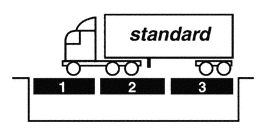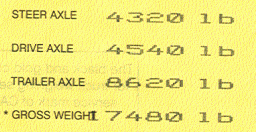RV and Tow Vehicle WeightsTowing Basics and DefinitionsGross Combination Weight (GCW) - Total weight of a fully equipped truck and trailer with cargo, driver, and passengers, fuel, coolant, equipment, etc. Gross Combination Weight Rating (GCWR) - Maximum allowable gross combination weight (GCW) Gross Trailer Weight (GTW) - The weight of the trailer plus all the cargo in it. This is measured by putting a fully loaded trailer on a scale. Gross Trailer Weight Rating (GTWR) - Maximum allowable weight of the trailer, plus its cargo. Gross Vehicle Weight (GVW) - The total weight of the tow vehicle, including driver, passengers, and any special equipment (options, accessories and upfitted equipment), cargo, fuel, collant, etc. Gross Vehicle Weight Rating (GVWR) - The maximum allowable total wieght of the tow vehicle, including driver, passengers, any special equipment (options, accessories and upfitted equipment), cargo, fuel, collant, etc. Definitions extracted from the 2001 Towing Guide For Dodge vehicle trailering applications, by Dodge Corporation. Calculating your Tow Vehicle and Trailer Weights
From the numbers shown on the above table, the truck is 750
lbs. under
the Gross Vehicle Weight Rating (GVWR) of 8,800 lbs., and the truck /
trailer
combination is 5,190 lbs under the GCWR of 20,000 lbs. The
final
numbers look excellent, so we purchase the truck and camper based
on
this research. We're doing good.
Weighing Your Tow Vehicle and Trailer
CAT Scale Website
Now that we have taken delivery of the tow vehicle and trailer (big smile on face), and all the options and accessories have been installed, the best method to determine the actual weights is to have them weighed on a truck scale. CAT Scale offers this service and is available at many truck stops. Visit the CAT Scale website to find a scale near you. When you drive on the scale, pull forward so that the front axle of the tow vehicle is positioned on the forward scale, the rear axle of the tow vehicle is on the center scale, and all trailer axles are on the rear scale. Notify that attendant that you are ready for a weight reading and collect the scale printout after paying the fee (currently $7.50). Make any notes as to how the truck and/or trailer are loaded, fuel load, water, etc., and whether there are drivers or passengers in the truck. Looking at the above picture, scale 1 is the steer axle, scale 2 is the drive axle, and scale 3 is the trailer axle(s). The combined weight of scale 1 and 2 is the loaded Gross Vehicle Weight (GVW) of the tow vehicle, and should not exceed the Gross Vehicle Weight Rating (GVWR) of the tow vehicle. The weight on scale 3 is the Gross Axle Weight of the trailer, and should not exceed the Gross Axle Weight Rating (GAWR) of the trailer. The sum of all three scales, shown on the sample as "gross weight" is the gross combined weight of the tow vehicle and trailer, and should not exceed the Gross Combined Vehicle Weight Rating (GCWR) for the tow vehicle. Empty Truck Weights from a Previous Weighing
Using the example for my truck show above (with full fuel), the GVW (scale 1 + scale 2) is 8,860 lbs, just slightly over the GVWR of 8,800 lbs. for a Dodge 2500 truck. The GCW of the truck and trailer combination is 17,480 lbs, which is 2520 lbs under the 20,000 lb. GCWR for the truck. Since I know that the unloaded curb weight of my truck as equipped is 7,150 lbs. (from a previous weighing), we can calculate the GTW as 10,330 lbs, which is well under the 13,000 lb. GTWR. Now lets look at the calculated vs. measured weights and see how the numbers compare. Loaded Truck and Trailer Weights
One other number that we should look at is the percentage of
the trailer
weight that is on the hitch. According to the article "Weights
& Balances for RV'ers" by Peter M Greig, the travel trailer
hitches
should carry 9-12% of the trailer's loaded weight, and 5th wheel
hitches
should carry 15-18% of the trailer's loaded weight. Other sources
uses numbers as high as 20-25% for 5th wheel hitches. For my
combination,
1,710 / 10,330 = 16.5%.
Wow! What Happened?First lets look at the dealer invoice for the truck. At the top, the shipping weight is shown as 6,945 lbs. That's 158 lbs. over what the brochure indicated. Let's see, I did get the sliding rear window, power seat, air dam, bigger tires, ... well, I guess it's pretty well loaded. I suppose that could explain 158 lbs. over the standard equipped truck in the brochure. Oh, did I forget to mention that after I took delivery of the truck, that I took it down to Line-X and had a bed-liner sprayed in. So, I called Line-X and asked "how much does an over-the-rail bed liner on an 8' full size truck weigh? 50 pounds. OK." Let's see, I also installed that Weather-Guard tool box, which weighs 57 pounds. I almost forgot the Westin step bars at 45 lbs. Let's add all this up and see how close are new calculated numbers are to the actual weight. New calculated GVW = 6,945 + 50 + 57 + 45 = 7,097 lbs vs measured weight of 7,150 lbs. Go figure. OK, that explains the discrepancy in the truck weights, but what about the camper? Well, I had the manufacturer add a Fantastic Fan and wiring for solar panels; let's figure another 10 lbs for these. After reviewing the specifications, I remember that the manufacturer is now installing 16" wheels and heavy duty axles on the trailer. Let's estimate 175 lbs. for these. The dealer did say that they would install two Trojan T-106 golf cart batteries. Let's go to the Trojan web site and see, ... 62 lbs. each. They also said that they would fill the propane tanks. This new trailer is really nicely equipped and has two 40 lb. propane tanks. I wonder how much propane a 40 lb. tank holds. OK, 80 lbs. of propane. As part of the dealer preparation, they filled the fresh water tank, tested all the systems, and then drained the tanks; but they didn't drain the water heater (10 gallons @ 8 lbs. = 80 lbs). Oh, I almost forgot, the RV dealer installed that 5th wheel hitch in the truck. It doesn't look that heavy, ... until you try to remove it. I'll get the bathroom scale and, wow ...160 lbs.! I know from a previous scale weight, that the camper, as delivered from the dealer, was actually 9,160 lbs. That leaves 511 lbs. unaccounted for. I attribute this to the manufacture being overly optimistic in their specifications, or weighing the unit without all of the equipment installed. Total weight as delivered from the dealer = 9,160 lbs. When I got the trailer home, I installed two solar panels (52 lbs.), a solar controller, wiring and misc. parts (13 lbs), an inverter (5 lbs), and stereo and TV equipment (30 lbs). So, when all the toys were installed, we've added another 100 lbs. Now let's load up the camper (as weighed above) for a trip. Add 30 gallons of water (240 lbs.), food, pots, pans, dishes, clothing, TV, satellite receiver and antenna, books, video tapes, beer, pop, lawn chairs, hiking equipment, bicycle and bike rack, bedding, etc. and we have now added another 830 lbs. of (very important) stuff to the camper, bringing our 8,020 lb. camper weight to 10,330 lbs! Summary of Trailer Weights
ConclusionAlthough I did not expect to see these numbers, I am very comfortable with the results, and also the way that the truck and camper handles. The truck performs well in the mountains of Colorado, a severe test for any tow combination. The stock HO 6 speed climbs the 11,000 foot passes well, and with the Jordan brake controller and the Jacobs exhaust brake, braking control is good on the 6% grades. The moral of this long discussion is: research tow vehicles
and trailers
very carefully, and then buy once. The alternative can be not
only
expensive, but dangerous as well.
Additional InformationCalculate Tow Vehicle / Trailer Weights Using This Web-Based Demonstrator Weight and Balance for RV'ers by Peter M. Greig from RVers Online |
||||||||||||||||||||||||||||||||||||||||||||||||||||||||||||||||||||||||||||||||||||||||||||||||||||||||||||||||||||
